Sticking with one job, one company, or even a single career is much less common than it used to be. This can be a blessing--or a burden. Some people like the freedom to switch careers or to develop a different interest, while others find that choice overwhelming. Practical concerns--about money, scheduling, or family commitments--play a role in career decisions whatever your age. What's interesting, though, is that no matter where you are in life--a recent graduate still supported by your family, or an older alum responsible for your own family--the questions one asks in making career choices are eerily similar, says Cambridge career counselor Phyllis R. Stein '63, Ed.M '70. "The clients I see range in age from 22 to 68," she says. "My profession exists because millions of people need help figuring out how to make their work work for them throughout their lives."
Stein cites four main categories of career-seekers: those whose talents, like painting, writing, or athleticism, lead them to jobs that support that talent; those who have known since junior high school what they wanted to be "when they grew up"; the pragmatists who evaluate their skills, values, interests, and goals and formulate an idea; and the wanderers who spend much of their 20s moving from job to job until one feels right and a career is built upon it. "If you put yourself in different environments, you have the ability to see what you might like. I call this the 'trying on different hats phase,'" Stein explains. "Meandering in your 20s is, for a certain part of the population, reasonable. Now, if you're doing that in your 30s and 40s, that becomes a whole other thing."
Stein, who was the director of the Radcliffe Career Services office for 21 years, now runs her own company. To anyone who is looking for a career for the first--or fifth--time, she recommends starting with books ("Stop reading when you realize they all say the same thing"). Professional and alumni networks are immensely helpful. Career workshops can also be useful, as is consulting with private career counselors, like her. "Some people spend years trying different jobs with no luck and they feel so confused they can't see their way out of the confusion," she says. "Career counseling is not therapy. Counselors help people with three things: figuring out what you want to do, strategizing about how to get it, and then going out and getting it."
It may sound pat, she acknowledges, but at the center of the process is "giving yourself permission to to take a real, hard look at what matters to you--what work do you want to do every day? Nobody ever said figuring that out was an easy task."
To help elucidate the decision-making process, Up Next asked six alumni to answer questions about some of the choices they have made since graduating. How did you decide what to do? What risks have you taken? Is there a "work-life balance"? What role did money play in your career choice? What do you wish someone had told you before starting out?
SOLEDAD O'BRIEN '88.
Television news reporter, New York City.
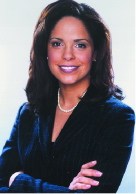 |
| Soledad O'Brien |
| Courtesy Soledad O'Brien and NBC |
In college, O'Brien planned on a medical career until she interned at Boston's NBC affiliate, WBZ TV, because she also liked to write. "I loved it...I completely changed course and decided I wanted to be a news producer," she says. She held various radio and television jobs, and appeared in front of the camera as the host of The Site when MSNBC debuted in 1996, which won her recognition. In 1999, she took her current job as co-anchor of the weekend edition of the Today Show. Two fan clubs--official and unofficial--chart her life and career on the Web.
O'Brien says hard work has assured her success. As a rookie in the field, she recalls being "egregiously underpaid," so she "milked" every opportunity for what it was worth. "In a lot of ways [the low pay] made me work harder and I got access to producers who were willing to help me, executives who would critique my tape, because I went above and beyond my actual job." The biggest professional risk she took was to switch from a job behind the scenes to one on the air when she joined San Francisco's KRON television station in 1993. "It's critical to tackle things you're not certain you can handle," she advises. "When you mess up, you just have to sit down and figure out what you got out of the negative experience. It's either that or crawl under a rock, right?" O'Brien also found mentors, the first of whom was an anchorwoman who offered an unvarnished look at life in broadcast journalism: "Unfair, difficult, often unrewarding, and high pressure," O'Brien recounts. "Hmmm.... Why did I stay?"
As for balancing life at home and work, the wife--and mother of one, with another child due at the end of March--questions whether it even exists. "I just try to get as much done in a day as I possibly can," she concedes. She has outside help--people who have explicit roles--and sets strict limits on her time. "I don't take calls when I'm putting the baby down. I don't take calls after 9 p.m.," she reports. She works around her young daughter's schedule--writing at night and in the early morning. At work, she delegates tasks more easily than she used to, and assesses what's really important--every day. "When news breaks, I work a ton--it's the nature of my job. But I take my vacations and I take my days off when I can--I never used to do that." Money is important, she warns. As a working mother, "a decent salary is critical. Childcare is so expensive that [working] would not be worth my time if I did not clear a certain number," she asserts. "The lack of good-quality, affordable childcare in this country is unfair to mothers who want to work, but can't afford to without top pay." Although she expects to be compensated fairly, O'Brien still maintains that love for the job comes first: "Being paid well for work you hate will only leave you frustrated."
Best advice? "Hard work will win out every time. Ignore most of the advice that people give you; listen to a handful of trusted mentors. Give a lot of your time and money--I think you pay in the end if you do people wrong along the way."
CLARENCE MAH '92, J.D-M.B.A. '99.
Restauranteur, Tampa, Florida.
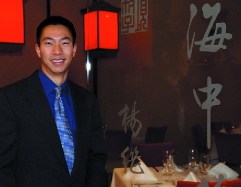 |
| Clarence Mah |
| Courtesy Clarence Mah |
The adrenaline highs and hang-around lows of restaurant life invigorate Mah. "You deal with all kinds of people of different backgrounds. You've got a chef with barely a high-school diploma and a manager with a graduate degree, not to mention all the countries that are represented by a kitchen staff, and, of course, the customers," he says. "It's a social experience. I'm the managing director. Whatever needs help, I'll do it: if the dishes need to be washed, I'm in there, if the maître d' is out, I'll go to the dining room. I like bringing together the whole package--the food, the people, the interior decoration."
The business is in his blood. Growing up in Montreal, he and his brother, Glenn Mah '94, M.B.A. '98, spent after-school hours at their parents' Asian restaurants. (The family also owned Ma Soba in Harvard Square until it closed last year.) "We'd do our homework, wash up, and fall asleep on a bed in a back room" his mother had installed so she could be near her children while at work, he says. His father was an aerospace engineer, and his mother a financial executive before they chose to become restaurateurs. Mah followed the parade of Harvard graduates into investment banking after graduation, but felt ill-suited, literally, for the work. "I'm not a grey-suit, white-shirt kind of guy," he says. "Now, if I want to wear something funkier, I can."
Other priorities began to surface: "I finally realized I wanted to be with my family, be in a social setting, be an entrepreneur and a generalist--not a specialist. I thought long and hard about sticking with restaurants after graduate school." All around him classmates were diving into the dot.com stream. "Some of them did well. Most of them did not," he says. "In the end, I chose restaurants because they were something I felt passionate about." He worked out a business plan and in 1999, soon after graduating, opened a more upscale version of the Harvard Square Ma Soba on Beacon Hill. That business was sold earlier this year, and Mah now runs two east-west fusion restaurants in Montreal and Tampa, both called Profusion, that he owns with his brother and Keyshawn Johnson, a wide receiver for the Tampa Bay Buccaneers.
As for work-life balance, there's not a lot of it. Mah works upwards of 10 hours every day of the week and tries to carve out a long weekend off once a month. The strenuous but somewhat flexible schedule allows the former varsity lightweight crew member his gym workouts, and he managed to complete the March 2001 AIDS Ride in Florida. He is also in a long-term relationship. "The relationship takes priority over any business that I'm in," he explains. "But it's always a big challenge to be a good partner and devote the time and attention needed to maintain a good relationship." As for risks, he says, "This is it, this is the risk--I'm in it." Mah's stellar résumé and multiple degrees typically ensure huge earning power, should he choose to employ it, and money was a worry when he first thought about his career. "I had bills to pay, loans to pay off. I can never say that money was not a factor," he says. "But I try to convince myself that what financial risks exist in doing the entrepreneurial thing are balanced by the fact that this work is more important to me personally. I don't need an infinite amount. I need a house, a car, and enough so kids can go through college...and, of course, splurging once in a while for a vacation--that would be nice."
Best advice? "Find and focus on your priorities."
ARDEN O'CONNOR '00.
Social entrepreneur, criminal-justice activist, Boston.
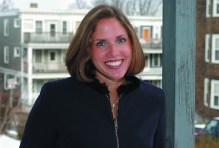 |
| Arden O'Connor |
| Justin Allardyce Knight |
O'Connor talks faster than a speeding train, has a million plans for the future, and within the last year has asked so many people for money that she has raised more than $150,000 in private donations. The money helped create Rediscovery House, a residence for teenaged males newly released from youth correction or behavioral treatment centers that opens this spring in Dorchester. "Utterly persistent" describes her--mildly. Growing up, she wanted to be a prosecutor, so she read books and wrote to renowned sexual-assault crimes prosecutor Linda Fairstein five times in the ninth grade and interviewed her for a class paper. O'Connor later followed up with Fairstein to land a coveted internship at the Manhattan district attorney's office.
Only her experience in the prisoner education program through Phillips Brooks House Association changed her determined mind. "I realized I didn't want to be responsible for putting people--who are primarily minority youth--behind bars when we as a society do not have a system in place to rehabilitate them when they leave," she says now.
O'Connor makes no bones of her disappointment in classmates who simply follow the pack into a "default career path, because it was easy to do. The opportunities for us are endless," she explains. "The Harvard name has opened so many doors for me that were not opened for other people working in the nonprofit sector. To waste opportunities by doing things we're not passionate about is a shame."
What about money? O'Connor admits she might think differently about finances if her family was not, at least temporarily, buoying her altruistic leanings. "I never anticipate making lots of money in the nonprofit world," she says. "I would love to believe that I would still be as enthusiastic about the job even if I had enormous debt and was struggling to pay my bills, but I don't know if that would be true." As for her personal life, O'Connor is thankful she has no one she is neglecting at this time of full commitment. "I feel this is my calling and I don't want to ever be doing anything different," she says firmly. "Right now."
Best advice? "Be persistent and follow up on opportunities."
JONATHAN D. FARLEY '91.
Mathematician, congressional candidate, Nashville, Tennessee.
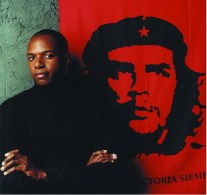 |
| Jonathan Farley |
| Courtesy Jonathan Farley |
Farley focused on math in high school because he "just loved it. I never really thought of being anything other than a math professor, mainly because both my parents are professors and I knew that I could lead a comfortable life." The only college he applied to was Harvard (an early risk, he notes); he went on to earn a doctorate in mathematics from Oxford, where he won the Senior Mathematical and Johnson Prizes. He joined the faculty at Vanderbilt University in 1996 after a fellowship at Berkeley and is currently on sabbatical at Oxford, having received a Fulbright Distinguished Scholar Award. Last year, Ebony magazine named him a "leader of the future."
Proud of the praise, but ready to tackle new projects, Farley has turned his formidable attention to another passion: politics. He is the Green Party candidate for Tennessee's fifth district. How can he run a campaign in absentia? "I'll be back in time for the elections," he assures. "Besides, it's a grass-roots campaign about the issues. It doesn't revolve around me."
Before choosing a professor's life, he dipped--briefly--into the world of commerce with an internship. "It was dreadfully dull," he says. "I could never do the 9-to-5 job with only 10 days of vacation per year, if that." Academia provides a "decent amount of money," he adds, "and we can get tenure, which means job security. Plus, my brothers chose more lucrative career paths than I did, so I can sponge off them when necessary." (All three of his siblings hold degrees of their own from Harvard.) He also happens to love teaching and reports, "I take time out to help black students when I can by bringing speakers to campus, attending their meetings, or directly tutoring them--even lending money." And he advises students "not to go to graduate school just because you can't think of anything better to do." Aspiring academics should start doing research as soon as they enter graduate school, and start attending professional conferences. "We're not businesspeople," he points out, "but networking is still important" because it provides contacts and insight into the field.
As a student, "I buried myself alive in the library; the first party I ever went to was in graduate school," he says. "But maybe I wouldn't have the options I have now if I had relaxed more then." In finding a work-life balance, Farley is one of those people who would do what he does now even if he didn't get paid--he has fun at work. "I am a pure mathematician, meaning nothing I do has anything to do with relevance to the real world--but everything to do with Truth." His field, called "lattice theory," is part of abstract algebra and deals with properties of order.
What is no less fun, but perhaps more "necessary," he explains, is his political work. It's a passion, and a compulsion. (He makes a point of not mixing politics with his academic duties, but notes, "Because of the type of job I have, I have time to run for Congress.") He was an invited speaker at an antiwar rally in London that drew 100,000 people last fall, he has written for national publications like Time, and he spoke up at Berkeley in favor of reparations for slavery and segregation. "One of my colleagues could have passed by and said 'Who is that radical guy? Let's make sure we never hire him!'" Farley says. "But that's a risk I was prepared to take. There are important issues to fight for"--like demolishing the prison-industrial complex, universal health insurance, and, of course, mandating "multivariable linear algebra for all United States residents," he says, "and I'm a waste of space if I don't use my position to help in that fight."
Best advice? "Keep in touch with the people you meet. Read Jean-Paul Sartre, Frantz Fanon, and Douglas Adams."
KATE (FORD) LAIRD '90.
Writer, sailor, Durham, New Hampshire.
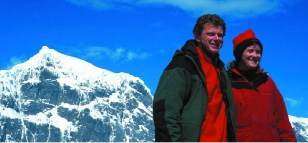 |
| Hamish and Kate (Ford) Laird |
| ©Hamish Laird |
Sailing for years in remote and treacherous parts of the world, where navigating around icebergs, "bergy bits," and the smaller ice chunks called "growlers" is a daily task, offers what Laird deems "in-your-face-risk. You're in a small boat on this really big ocean. Everything is up to you--there is no Triple A. When the wind rushes in and the waves come, you could be washed off the boat and that would be it." On the other hand, she surmises, "I'm probably at almost as much risk driving to the mall."
Sailing is a career she fell into a week after graduation when she boarded a yacht to be the tutor (and part of the crew) for a family traveling around the South Pacific for five months. Upon her return to the United States, she earned a master's degree in creative writing, "But I don't think I've written a word of fiction since," she says; instead she's published nonfiction stories primarily on sailing for the Wall Street Journal (where she chronicled her own voyages) and boating publications. One day the owner of an expedition yacht that travels to Antarctica offered her a spot on board so she could write about it. "It was a last-minute thing, and I just went," she says.
The adventure lasted for three years--during the last two of which she was a member of the crew. In the middle of it all she married the boat's captain, Hamish Laird. These days, the couple live on dry land, raising their toddler Helen, expecting a second child in March, and building a 56-foot aluminum expedition yacht of their own. It should be ready in a few years--just in time for the children to start learning how to sail. The notion is that they will run charter trips of their own to Greenland and Labrador (where they have not yet ventured), as well as to Antarctica. "There was no real plan at all," Laird says of her career choice. "I wasn't a good enough linguist to make my East Asian history concentration into a long-term career. But I was always interested in writing. And I sailed a bit growing up in Durham."
Regarding their current stateside risks, she says that building the boat is a daunting financial and psychological challenge. "I used to think freelancing--knowing that when you don't work, you don't make money--was bold and brave," says Laird, "but doing something like this is even more shocking because you have to be careful about putting everything you have toward this project."
Laird and her husband are bound by marriage and vocation; their work and their lives are the same thing. "When you're on a boat in the Antarctic, you'd better like the person you're with because you don't get off," she notes. "There are no weekends." Even now, "We're always thinking about the boat; at breakfast, we talk about fuel fittings." Once it's done, they expect to live on board as a family, and teach the children themselves--at least until high school. "We'll be able to show Helen, and this other one, what the world is about," Laird says. "I think it's a fantastic way to grow up." The couple are doing a variety of things to support themselves while building the boat: she freelances, Hamish is a guide on sailing yachts, and they both work as boat-trip consultants. "Initially, money will be quite important to finish the boat," Laird adds. "Eventually, we'd like to get to the state where we can do enough charter work to keep the boat in excellent condition, but then have time for ourselves, with the kids."
Best advice? "Since in some ways I haven't really gotten a job yet, I don't have an answer to that. But I would say it's a lot easier to find something you really enjoy doing, and then figure out how to make that into a career."
JOHN A. CAPELLO '96.
High-tech entrepreneur, Cambridge.
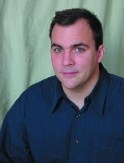 |
| John Capello |
| Courtesy John Capello |
The word "start-up" had not been coined when Capello graduated and began working at a fledgling software firm called Abuzz. "It was 'So, you're working for a small company nobody's heard of,'" he says. The software, called adaptive profiling, culled the knowledge or capabilities of a person through a question-and-answer session and tracked the individual's ability to answer questions correctly over time. Once the data were stored, he explains, "You could ask, 'Does anyone know about the tax ramifications for a hardware manufacturer in Estonia?' and the computer would find someone who did."
The software was soon being sold to Fortune 500 companies to facilitate communication and problem-solving among their employees. In July 1999, the New York Times company bought Abuzz to create a much larger version of the software to serve its readers and on-line community. The software grew and was sold as a networked application, but in September 2000, as many dot.com companies began to falter, there was an advertising slump on-line as well as on paper, Capello says. By January, it was clear cutbacks were necessary, so Capello, who was then general manager of Abuzz, submitted three proposals, the most severe dictating that half the company be let go, himself included. "I said to them, 'Here's how you do it,'" he recalls. "I was a little surprised to see them doing it now." Capello had, in effect, laid himself off.
Now he is working on a new venture and he is married more to his wife than to work. There are no more days of working 8 a.m. to 6 p.m., then returning to work from 8 p.m. to midnight. And the pay scale shows signs of improving. "When I started out, I had no other responsibilities," he says. "I got paid nothing for four months and I could do things like eat ramen noodles for a week and be happy and live in really awful apartments. And I mean really awful. In 1997, I had to leave a place because it was rat-infested." (He moved into Cabot House as the music tutor, thankful for the vermin-free room and board.) Abuzz was "a weird sort of commune," he says. "We slept at the office, we all went running together, we ate dinner together, we even had a movie night. I'm still in touch with most of them."
The new company he has started in Cambridge, C-ing Machines Inc., will be launched by the end of March. It makes and sells video servers--pieces of hardware that play videos on television. "It's like a VCR that can talk to your computer," he explains. What most inspires Capello in work is "being able to make choices with the direction of your work and having control over that."
The patriarchs in his family have all been small-business owners, though Capello started out wanting to be a musician. As a student at Louisiana State University, he studied the double bass, but his teachers spoke frankly about the profession. "They said that if I could think of anything else to do that would make me happy, I should do that, not music," he recalls. Part of his decision to transfer to Harvard reflected a growing recognition that musicians lived a life he did not necessarily want. "There is always a feeling that you're not being rewarded for the talents that you have," he explains. "It was frustrating to see so many talented people unable to find work or play the type of music they wanted to play." At Harvard, he did a double concentration in music and social studies and by senior year knew he wanted to start his own business or help someone else start one. It turned out that his roommate's brother was launching Abuzz.
Capello is keenly aware that there is more at stake in his new business: he invested much of his own money, he is married and wants to have children within the next few years. "Your thinking evolves. You start to have a more practical expectation of money," he says. "I want to be able to pay whatever my costs are." He also wants more balance in his personal life. Having taken a break from playing much music during the Abuzz years, he now plays around Boston as a freelance bassist three times a month. "If I was hustling, I could get a lot more work than that, but this is great for me," he says. "It's a good release and it's fun to play with a lot of different people."
Best advice? "Try it. Try whatever you want to and if it doesn't work, shift, and try something else. I can't think of anyone I really admire in business who has not failed in some way."





